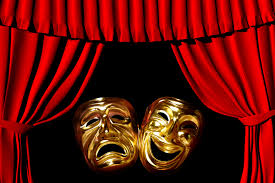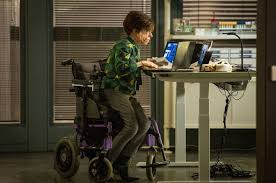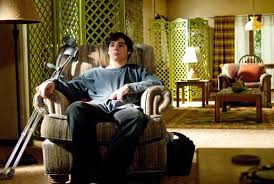Should deaf and disabled actors be the only ones eligible to play roles that feature disability? It might seem they have a compelling case, but according to MICHAEL UNIACKE, that isn’t the best question to ask.
THE ANSWER TO THE QUESTION of deaf and disabled actors playing disabled characters  sounds obvious – of course they should. However the more you investigate this question, the more it breaks down into further questions, notably about the nature of the actor’s craft. (Here, I use “actor” as a gender-neutral term that includes both males and females.) Should only disabled actors take on roles that feature disability?
sounds obvious – of course they should. However the more you investigate this question, the more it breaks down into further questions, notably about the nature of the actor’s craft. (Here, I use “actor” as a gender-neutral term that includes both males and females.) Should only disabled actors take on roles that feature disability?
That is not the best way to frame the real and entrenched issue of disabled actors lacking opportunities to practice their craft. Such a question locks disabled actors, in fact all actors, into pre-ordained roles. This question leaves hanging the implication that disabled actors should not take on non-disabled roles. British actor and disability activist Liz Carr already does so. She plays Clarissa Mullery, a forensic scientist in the BBC crime thriller series, Silent Witness. Another British actor Ruth Madeley, who is in a wheelchair, plays a detective in the ITV crime series The Level. Neither role has anything to do with disability.

The question furthermore invites the unfair argument suggesting that actors should only play who they are. So only German actors should portray German characters. Or only gay actors should play gay characters. Or that roles for murderers should only go to actors who have killed someone. And my all-time favourite: only actors who have managed to raise themselves from the dead should play the role of Jesus Christ. It’s an unfair question because it negates the actor’s art.
ONE OF THE PERSISTENT criticisms of the lack of opportunities for disabled actors is that they can’t get roles because abled-bodied actors ‘crip-up’ in order to play disabled characters. This was hammered home in a 2016 survey and research paper that investigated the employment of disabled actors on American television and streaming services. The survey, by the Ruderman Family Foundation, concluded that on US television, non-disabled actors played 95% of the roles of disabled characters. According to the survey analysis, this happens because of “the unconscious or conscious bias of the industry gatekeepers”. As disabled actors all over the world might chorus, what else is new?
Much of this argument is not surprising. The worse of these gatekeepers might be film financiers, who may insist on big-name actors for particular roles. With the passable exception of deaf actor Marlee Matlin, there are no big-name actors who are disabled. But there do remain writers, casting agents and producers who remain oblivious to the skills of disabled actors. When it comes to financiers, casting agents and directors – the people who ultimately make the decisions on who gets what roles – the degree of ignorance about disability is a prevalent as with anyone else.
Part of the reason there are so few roles for disabled actors is because they have nowhere the same opportunities for breaking into acting as do non-disabled actors. What were the attitudes of those who influenced the dreams and hopes of disabled people who wanted to become actors? Why were they rejected for drama school? Was the drama school accessible? Could they even get to drama school in the first place? What do they do if they can’t audition simply because they could not get into the theatre in the first place?
The film industry needs informal affirmative action to support disabled actors. Ideally, film roles should always go to the best actor for the part. However, by affirmative action, the industry should encourage and support disabled actors to audition widely. The film industry needs information about the skills and capabilities of disabled actors. Casting directors and other influential industry gatekeepers badly need a solid shaking up about their attitudes and knowledge about disabled actors. It’s not rocket science.
THE TERM ‘CRIPPING-UP’ REFERS to non-disabled actors who assume disability as part of their role in portraying disabled actors. With reference to disability, it’s a misleading term. The word ‘crip’ grabs attention, but has an emphatic link to obvious physical disability. This rules out the vast number of disabilities that are hidden, subtle or episodic. No one, for example, would describe a hearing actor playing a deaf character as cripping up. ‘Deafening-up’? Maybe.

The American actor R J Mitte has cerebral palsy. He is well known for his portrayal as Walter Junior in the Sony Pictures series Breaking Bad. He revealed in an interview that he worked to get his cerebral palsy in his screen role worse than it actually was in real life. Effectively, he was a crip who cripped-up. So, cripping-up can cut both ways: a disabled actor could also crip-down. That is simply part of the actor’s craft.
Critics of cripping-up compare the practice to ‘blacking-up’, or worse, the discredited ‘blackface’, in which white actors use black make-up to portray black roles, often to exaggerate perceived racial characteristics. The blacking-up argument is potent, but the comparison is inexact. Blacking-up had a certain benign malice, a less-than-subtle putdown that is generally absent from cripping-up. The worse aspect of cripping-up is when it deprives a disabled actor of a chance; especially out of ignorance or for spurious reasons of attitudes towards disabled actors or directors’ favouritism.
Perhaps more relevant than cripping-up: is there a point at which the authenticity of a lived experience for a role in disability is beyond the skill of an actor to research and reach? Or if you like, at what point does a lived experience of disability become more important than the craft and the skill of an actor? Merely because someone has disability X, does not mean they will be better at acting a character with disability X, than any actor without disability X. But why not cast a disabled actor into any role of which he or she is capable? Empathy, research, and sensitivity are all part of the actor’s skills. A good actor can become anyone. The better question becomes – who is the best actor for the part?
Acting a deaf character is a lot more than knowing a few signs and putting on a pair of shifty, darting eyes.
FOR DEAF ACTORS, THE 2014 French film La Famille Bélier, raised a sour cocktail of issues, notably in its assumptions about and portrayals of deaf people. The film showed them as hilarious buffoons helpless in this world unless there was a hearing person nearby. These roles were not malicious, but at times they were hard to take. Hearing actors deafened-up, and literally, signed-up for their roles by learning French Sign Language. And going by comments from many in France’s Deaf community, they didn’t do a very good job. Deaf actors face the same prejudice as disabled actors – directors and casting agents do not realise how good these actors can be. For example Marlee Matlin has played a hearing woman.
In spite of my inclination to have faith in the skills of the actor, I hesitate when it comes to deafness. Acting a deaf character is a lot more than knowing a few signs and putting on a pair of shifty, darting eyes. Could a hearing actor ever capture the innate rat-cunning: the perception, intuition and prediction, honed over a lifetime, by which many deaf and hearing-impaired people navigate the world? I don’t know.
What I do know is that I would take a deep breath and watch a hearing actor get on with it. Because I remember listening to Brad, an actor with whom I once shared a house, as he talked to me about the craft of acting, as he drew me a little into the actors’ world. Because I watched my daughter on the stage, and saw how completely she became transformed.
And yet, are there roles that remain beyond the skill of the actor? Somehow, I doubt it. If the role brings in disability, then a disabled actor will be hard to go past. In the end, lived experience means something, but I dislike rules that dictate this actor may play this role, but must never play that role.
WHAT IS MISSING FROM this issue is recognition of the universal love for the craft of acting. Deaf, hearing, disabled and non-disabled actors are all in the game for the same reason – most share an utter passion for learning and becoming another character, in another place, in another time, in another world. Some actors do have particular insights. As people, some actors are who they are because of particular experiences that will add authenticity and power to their craft. When it comes to deafness and disability, that is something that film-industry gatekeepers should understand and respect. Instead of assuming that non-disabled actors need to crip-up for roles that portray disability, it’s better to think that all actors can crip-with, deafen-with, and sign-with.


Leave a Reply